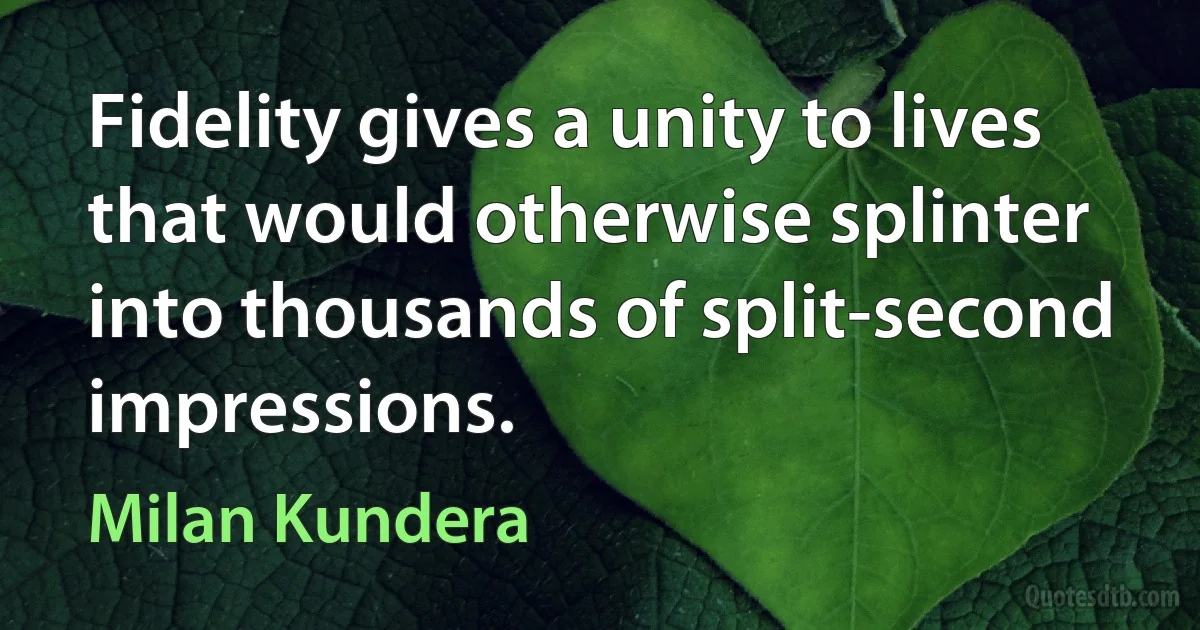Fidelity Quotes - page 6
The artist, however faithful to his personal vision of reality, becomes the last champion of the individual mind and sensibility against an intrusive society and an officious state. The great artist is thus a solitary figure. He has, as Frost said, a lover's quarrel with the world. In pursuing his perceptions of reality, he must often sail against the currents of his time. This is not a popular role. If Robert Frost was much honored in his lifetime, it was because a good many preferred to ignore his darker truths. Yet in retrospect, we see how the artist's fidelity has strengthened the fiber of our national life. If sometimes our great artist have been the most critical of our society, it is because their sensitivity and their concern for justice, which must motivate any true artist, makes him aware that our Nation falls short of its highest potential. I see little of more importance to the future of our country and our civilization than full recognition of the place of the artist.

John F. Kennedy
Men who are never flagrantly dishonest are at times unveracious in small matters, colouring or suppressing facts with a conscious purpose; and writers who never stole an idea nor pretended to honours for which they had not striven, may be found lapsing into small insincerities, speaking a language which is not theirs, uttering opinions which they expect to gain applause rather than the opinions really believed by them. But if few men are perfectly and persistently sincere, Sincerity is nevertheless the only enduring strength.
The principle is universal, stretching from the highest purposes of Literature down to its smallest details. It underlies the labour of the philosopher, the investigator, the moralist, the poet, the novelist, the critic, the historian, and the compiler. It is visible in the publication of opinions, in the structure of sentences, and in the fidelity of citations.

George Henry Lewes
Of all the bull-baiting in England one half is carried on in Staffordshire and Lancashire. The best soldiers in the kingdom, the most brave and the most faithful to their colours, come out of those counties, particularly Staffordshire. The bravery and fidelity of Staffordshire men are proverbial through the army, and has been so for two hundred years past. The Staffordshire Regiment of Militia is not only the finest but best-behaved regiment of militia in the kingdom. Wherever this regiment goes, it is followed by a score or two of bull-dogs, no bad emblem of the character of the soldiers themselves.

William Cobbett
Speaking of an institution such as marriage as natural is, of course, paying it a compliment, the compliment of saying that it meets a fairly central human need. The fact that it is found in some form in every human society is in a way enough to show. But it might be thought that marriage became thus widespread only because it was, like adequate sanitation, a means to an end. This is pretty certainly what Hume thought, as evidenced by his very confused contrast of natural with artificial virtues. He regarded human sagacity simply as the power to calculate consequences, and counted chastity and fidelity, with justice, as artificial virtues, devices designed merely to produce safety and promote utility. In a species as emotionally interdependent as man this view of marriage is nonsense. Pair-formation could never have entered anybody's head as a device deliberately designated to promote utility.

Mary Midgley
The laws and the entire scheme of our civil rule, from the town meeting to the State capitals and the national capital, is yours. Your every voter, as surely as your Chief Magistrate, under the same high sanction, though in a different sphere, exercises a public trust. Nor is this all. Every citizen owes to the country a vigilant watch and close scrutiny of its public servants and a fair and reasonable estimate of their fidelity and usefulness. Thus is the people's will impressed upon the whole framework of our civil polity - municipal, State, and Federal; and this is the price of our liberty and the inspiration of our faith in the Republic.

Grover Cleveland
Our celebration of initiative and enterprise, our insistence on hard work and personal responsibility, these are constants in our character. But we have always understood that when times change, so must we; that fidelity to our founding principles requires new responses to new challenges; that preserving our individual freedoms ultimately requires collective action. For the American people can no more meet the demands of today's world by acting alone than American soldiers could have met the forces of fascism or communism with muskets and militias. No single person can train all the math and science teachers we'll need to equip our children for the future, or build the roads and networks and research labs that will bring new jobs and businesses to our shores. Now, more than ever, we must do these things together, as one nation and one people.

Barack Obama
Being in love is a good thing, but it is not the best thing. There are many things below it, but there are also things above it. You cannot make it the basis of a whole life. It is a noble feeling, but it is still a feeling... Knowledge can last, principles can last, habits can last; but feelings come and go... But, of course, ceasing to be "in love" need not mean ceasing to love. Love in this second sense-love as distinct from "being in love"-is not merely a feeling. It is a deep unity, maintained by the will and deliberately strengthened by habit; reinforced by (in Christian marriages) the grace which both partners ask, and receive, from God... "Being in love" first moved them to promise fidelity: this quieter love enables them to keep the promise. It is on this love that the engine of marriage is run: being in love was the explosion that started it.

C. S. Lewis

